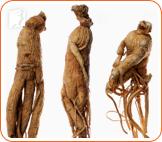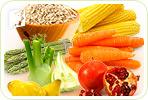Long valued for its use as a treatment for memory loss, in recent years ginseng has become widely used to treat the symptoms of menopause. Many women have reported that the herb relieves symptoms like hot flashes, mood swings, and night sweats.
But, where can you find the herb, and what forms does in come in? Ginseng has exploded in popularity in recent years, and can be found in most health foods stores. Keep reading to find out more.
Ginseng: an Overview

Native to East Asia, ginseng has been used for centuries in both Japanese and Chinese medicines for the treatment of a host of ailments. The herb was used primarily to fight the effects of memory loss during old age, but also found use among women, particularly those going through menopause. The herb was found to not only boost mental function in older women, but also to combat common symptoms like hot flashes, mood swings, and fatigue.
More recently, the use of ginseng has spread throughout the world. It can now be found in most grocery store supplement aisles and is used popularly by both men and women. Researchers are just beginning to understand how the herb works as a treatment for menopause.
Where to Find it

Ginseng comes in many forms, the most common of which is a concentrated form contained within a capsule. Capsulated ginseng can be found in the health supplement aisles of most major grocery stores, and is the most concentrated form of this herb. Be aware that taking too much ginseng in this form can lead to some unpleasant side effects, including headaches, nausea, and vomiting.
Ginseng can also be found in the form of herbal tea. This is a less concentrated method to take then the herb, and women should be aware that they may not feel the same effects; however, drinking this tea regularly should obtain the desired effect.
Alternatives to Ginseng
Ginseng can be a good way to fight your menopause symptoms, but it is certainly not the only way. Some alternatives, such as lifestyle changes, have the advantage of being not only easily accessible but also free. Regular exercise and improved diet can boost hormonal production, tackling the root cause of most menopause symptoms.
Want to know more? Click on the following link to learn more about the different menopausal symptoms and how to deal with them.
Sources
- BMJ Group. "Menopause: What is it?" Patient Leaflet. 2007.
- Hopkins, Virginia. Lee, John R. M.D. What Your Doctor May Not Tell You About Menopause. New York: Warner Books Inc., 1996.
- Love, Susan M.D. Menopause and Hormone Book. New York: Three Rivers Press, 2003.
- Martin, Raquel. The Estrogen Alternative. Rochester, VT: Healing Arts Press, 2000.


